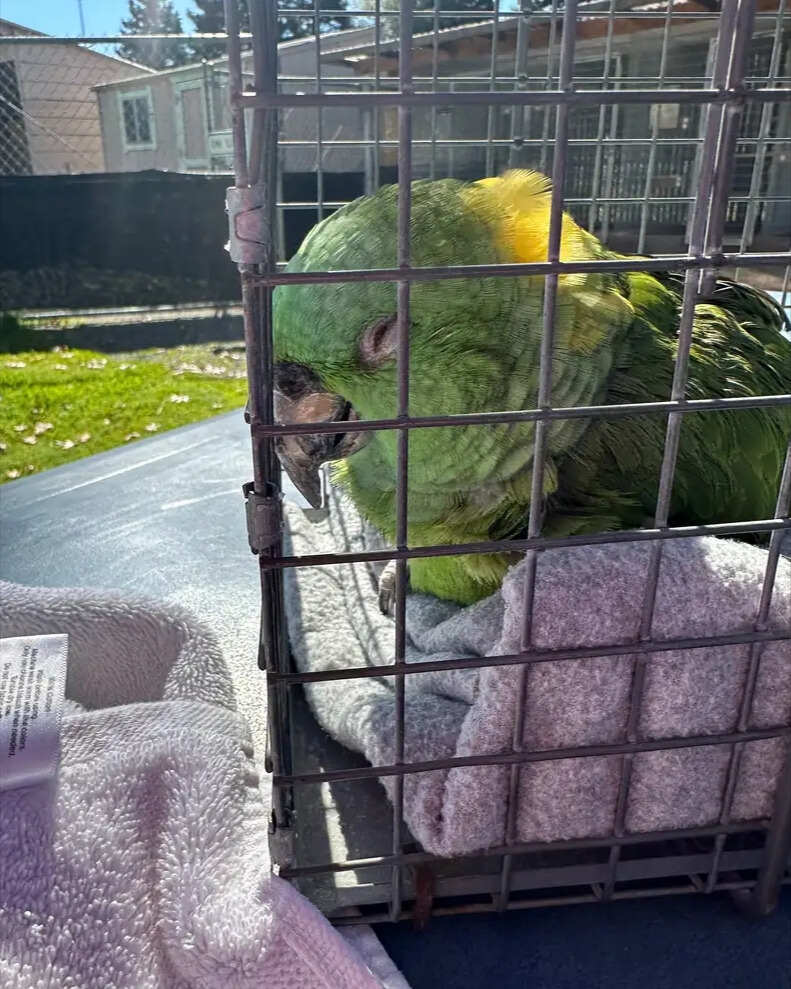When rescuers first found Debbie, the 40-year-old parrot was barely hanging on to life. She had endured two long, lonely weeks in an empty house after her beloved owner passed away. There was no fresh food, no comforting voice, and no sign that anyone knew she was there. The silence was suffocating, and each day she grew weaker. She did her best to hold on, but by the time help arrived, the effects of that isolation were painfully clear.

Debbie was rushed to Marin Humane just in time. Staff members immediately recognized how dire her condition was. “She could barely stand,” recalled Sam W., the shelter’s operations manager. “She would eat and drink, but very slowly. She needed constant support—special perches, a padded enclosure to protect her if she fell, a heat source, therapeutic lighting, gentle handling, and a carefully enriched diet to help her regain strength.”
In those early days, Debbie was almost unrecognizable compared to the vibrant bird she must have once been. Her voice—likely cheerful and chatty in better times—was silent. Her body, once lively and alert, was now hunched and frail. Her eyes, which should have been bright with curiosity, seemed distant and tired. She wasn’t just physically weak; emotionally, she had shut down, retreating into herself after such a traumatic loss.
Still, even in that fragile state, there was a small spark left in her—a quiet flicker of will that hinted she hadn’t given up completely.
The shelter staff committed themselves to her recovery, treating her with patience, warmth, and gentle consistency. They provided a calm environment, predictable routines, and most importantly, presence. Slowly but surely, Debbie began to show signs of life returning. At first, it was subtle—she could hold her head up for longer periods. Then she accepted food more eagerly. Soon after, glimpses of her personality began to shine through.
“As she felt better and got stronger, she got brighter and a bit more sassy and opinionated about things,” Sam shared with a smile. “We knew Debbie was still in there.”
Her healing continued when she moved to a foster home with Carina, who understood that Debbie needed to move at her own pace. There was no rush, no pressure—only kindness and space to feel safe again.
“When she first arrived, she would hunch over and quietly hiss at me the whole time,” Carina recalled. “She was clearly still afraid. But after a few days of strategic corn deployment, she started to perk up. Now she’s curious every time I walk into the room. She wants to see what treats or goodies I’ve brought her.”
Carina works from home, often sitting beside Debbie’s open cage. Debbie isn’t ready for physical contact yet, but that’s perfectly fine. They’re building something more important than instant affection—they’re building trust.
Each day now starts with Debbie’s cheerful “hello,” followed by a playful, “Whatcha doing?” She loves her window perch, where she can watch the world go by—keeping an eye on the birds, squirrels, and, for reasons only she knows, the garbage truck that fascinates her every week. She makes soft, happy sounds when it’s mealtime, clearly enjoying the comfort of routine and the safety she feels in her new surroundings.
Thanks to the quick action of her rescuers and the devotion of those who care for her, Debbie’s story didn’t end in that silent house. Instead, she’s writing a new chapter—one filled with warmth, light, and the promise of better days ahead.
But her journey is not yet complete.
Debbie is still waiting for her forever home—one that understands the unique needs of senior or emotionally delicate parrots. She would thrive in a peaceful, sunlit space where she can spend her days near someone who is home often. She may never want to be a bird you can cuddle, but for the right person, she will offer loyalty, gentle companionship, and delightful little surprises.
“She would probably enjoy a home with plenty of natural light and big windows so she can watch the outside world,” Sam explained. “It should be someone who’s around most of the time to keep her company, but who is comfortable with the idea that she doesn’t need a lot of hands-on interaction.”
At 40 years old, Debbie may be in her senior years, and her movements might be slower, but she’s far from done living. She’s certainly not done loving.
From the depths of silence to the return of her voice, from fear to trust, Debbie’s transformation is a testament to the power of second chances. Her resilience reminds us that recovery is possible, even after long periods of neglect and grief. With patience, kindness, and understanding, an animal’s spirit can awaken again—sometimes brighter than before.
Debbie is living proof that love, in all its quiet forms, can bring a soul back to life. She’s no longer just surviving; she’s beginning to truly live again. And for the person who eventually welcomes her home, Debbie will be more than just a pet—she will be a daily reminder that every living being, no matter their age or past, deserves compassion and the opportunity to feel safe and loved once more. 🕊️💛





